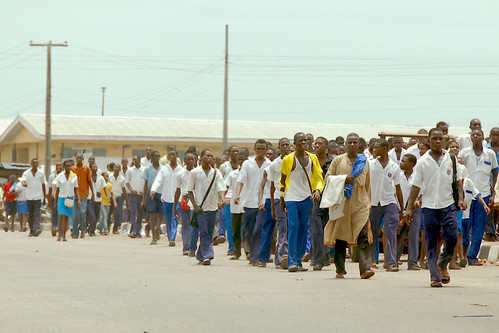 The reason I chose this topic is because of the group I was invited to on Facebook - I know we've all gotten those "I'll donate $___ to ___ if 23452478657345 people join!" invites, but this one looked a little more promising: The H20 Project (you might have to log in to see it, but that shouldn't be a problem for anyone) suggests that you give up every beverage but water for two weeks and then donate the money you save to the H20 Project. This actually makes a lot of sense, it's a pretty easy way to donate, and it's healthy! I already drink water all day anyway, but if I didn't buy my gallon of milk or coffee for two weeks, that would easily be $10.
The reason I chose this topic is because of the group I was invited to on Facebook - I know we've all gotten those "I'll donate $___ to ___ if 23452478657345 people join!" invites, but this one looked a little more promising: The H20 Project (you might have to log in to see it, but that shouldn't be a problem for anyone) suggests that you give up every beverage but water for two weeks and then donate the money you save to the H20 Project. This actually makes a lot of sense, it's a pretty easy way to donate, and it's healthy! I already drink water all day anyway, but if I didn't buy my gallon of milk or coffee for two weeks, that would easily be $10.It's so depressing to think that the grocery store I work in has a full aisle of soft drinks, another of juice and milk, and two aisles of alcohol (yep... that's a college town for you), and my job at the coffeeshop is just to make drinks, while people in other parts of the world can't even get a class of clean water every day.
Living Water International has a lot of information on their site, but here are some clips about access to water, lack of sanitation, and social effects:
"Water, the stuff of life and a basic human right, is at the heart of a daily crisis faced by more
than one billion of the world's most vulnerable people.
Nearly half of all people in developing countries are suffering from water-related health problems. The annual number of deaths from water-related diseases is six times greater than the number of deaths from armed violence.
One-third of all deaths in developing nations are children under the age of five. Some 1.8 million of these children die each year as a direct result of chronic diarrhea—that's 4,900 every day. That is directly related to the water they drink.
Almost two-thirds of people who lack access to clean water survive on less than two dollars a day, and one-third live on less than one dollar a day. Some might lack water because they are poor, others might be poor because they lack water, but the statistics show a two-way relationship between poverty and water deprivation.
In Sub-Saharan Africa, the money lost from missed work opportunities due to water-related illnesses exceeds the amount of aid and debt relief to the region.
In Africa and Asia women are generally responsible for collecting water for their families. On average, in rural Africa, women spend 26% of their time collecting water, which often means having to walk five miles or more to the nearest water source. In the dry season, when water becomes more scarce, this distance can double and it can take hours just to fill up one container as the water slowly filters through the ground."
Living Water International's site has many other news stories and information, there are several other links on the Introduction page and a seperate page for their mission statement and history.
Overall, I think this organization looks incredible. I've heard of the Living Water group before (organizations like this get a lot of spotlight time over in the College of Health and Human Services), but this is the first time I've been able to think about it and know some of the cultural context for its purpose. It is important to remember that every time we get depressed in class because of what we read, there are already groups like this that exist to help, there are people in the world who care.

(I found this last map from Columbia University's site, if you ever want a map of something really random and hard to find, they might have it)






